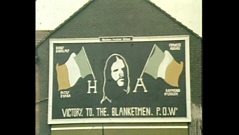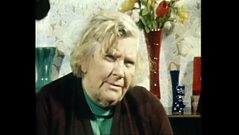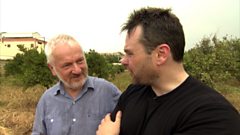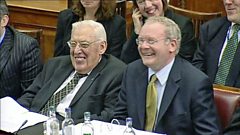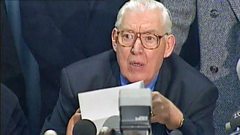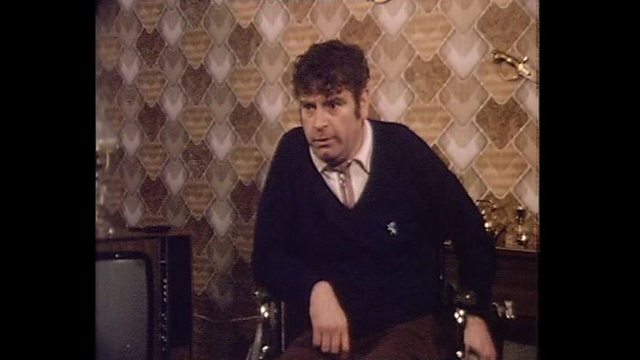
Loyalist perspectives following the 1981 hunger strike
Gavin Esler assesses the mood within the loyalist community following the 1981 hunger strike with Councillor Sammy Millar and Maurice Morrow, DUP vice-chair of Dungannon Council.
Reporter Gavin Esler talks to Sammy Millar, a loyalist councillor from the Protestant Shankill Road, who survived an assassination attempt by the Irish National Liberation Army. He was shot, they said, because of his Ulster Defence Association (UDA) links. He is now crippled for life after a bullet shattered his spine. He recalls the terrifying events of the night he was shot and praises the staff at the Mater and Musgrave Park hospitals in Belfast who helped save his life. Sammy Millar tells Esler that he is campaigning with other Catholic and Protestant patients for recreational facilities/centre for disabled people. He is determined to carry on his council work for his constituents on both sides of the political divide. He criticises the Secretary of State for Northern Ireland, James Prior MP, for his decision to allow prisoners fifty percent remission and other privileges. He has no hatred for Roman Catholics but hates the gunmen who crippled him. He believes the people of the Protestant Shankill Road and Catholic Falls and Andersonstown areas are living in fear of the gunman. He lost a brother-in-law (a full time member of the UDR) in 1972 and a cousin, Robin Shields, who was an ambulance controller in the Royal Victoria Hospital in 1980. He can’t understand what the gunmen hope to achieve with their violence. He believes they will achieve nothing.
Esler’s report shifts from the Shankill Road to rural Northern Ireland. Using footage of Rev Ian Paisley leading over a thousand men marching in military formation through Sixmilecross, Esler explains that this protest march is the Protestant veto on the IRA (Irish Republican Army) achieving anything. The march, he says, is a loyalist gut reaction to Bobby Sands’ by-election victory in Fermanagh-South Tyrone. It recalls the spirit of 1912 when Carson’s Volunteers opposed Home Rule. The marchers want a Protestant defence force to be set up on similar lines. Maurice Morrow, DUP (Democratic Unionist Party) vice-chairman of Dungannon Council, was on that march and he tells Gavin Esler that the Government’s response to the hunger strike was wrong. In his view Secretary of State James Prior was a weak man. He says Protestants can’t understand why the government capitulated to the hunger strikers’ demands after it had faced them down. He believes that Margaret Thatcher did not live up to her reputation as the Iron Lady, but was more the “Lady of Tinfoil”. Asked why he takes to the streets rather than use the political process, Morrow responds by saying the government has ignored the ballot box. He is determined the Protestant people will not be coerced or cajoled by the Secretary of State into a united Ireland and that they will take whatever steps necessary to preserve the union.
Duration:
This clip is from
More clips from After the Hunger Strike
-
![]()
Catholic perspectives following the 1981 hunger strike
Duration: 07:43
-
![]()
Mother takes her son off hunger strike
Duration: 03:30
More clips from Spotlight
-
![]()
Hamza and Salam's escape—29/09/2015
Duration: 01:59
-
![]()
A Long Way from Clare to Here—29/09/2015
Duration: 02:25
-
![]()
Paisley and the Good Friday Agreement—Paisley and the Pretender
Duration: 02:13

